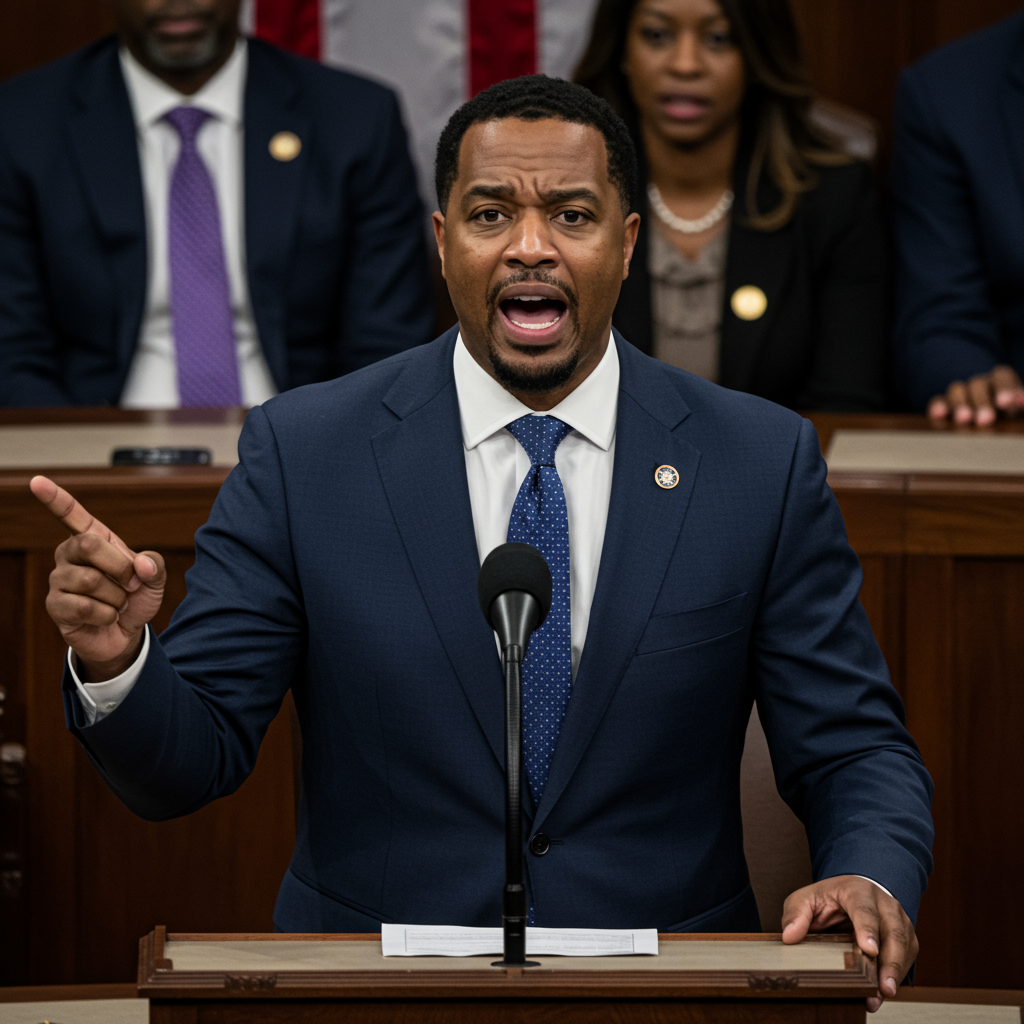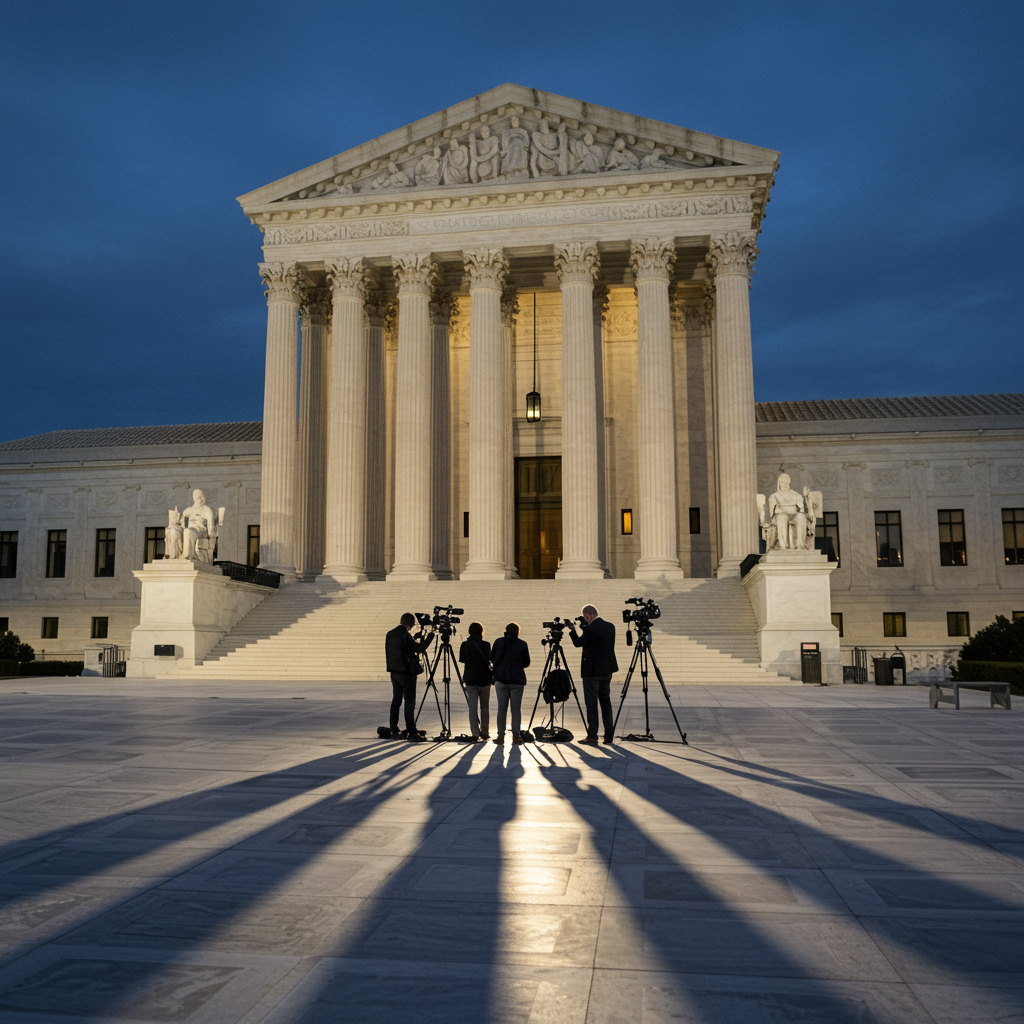In a dramatic move on the House floor, Democratic Leader Hakeem jeffries delivered a marathon speech lasting over eight hours. This historic address set a new record for the longest continuous speech in the chamber’s history. Jeffries used the unusual tactic to voice fierce opposition to a major spending and tax cut bill championed by former President Donald Trump. The lengthy oration successfully delayed a crucial final vote on the legislation.
Jeffries began speaking before dawn on a Thursday, taking the podium just before 5 a.m. He continued his remarks for a remarkable eight hours and 44 minutes. This extended period of speaking time is permitted under a specific House procedure known as the “magic minute.” This rule grants leaders of both parties unlimited time to speak after formal debate on a bill has concluded.
Setting a New House Record
The tactic of a lengthy “magic minute” speech has been used before to draw attention to significant legislative battles. The previous record holder was then-House Minority Leader Kevin McCarthy. McCarthy spoke for over eight hours in 2021. His speech opposed President Joe Biden’s comprehensive Build Back Better Act. Jeffries officially surpassed McCarthy’s record at 1:26 p.m. ET that Thursday. His intent was clear: make a forceful final stand against a bill he deemed deeply harmful.
Jeffries arrived at the podium prepared, surrounded by stacks of binders containing details he planned to dissect. His speech systematically picked apart various aspects of the proposed legislation. He also directed sharp criticism at Republican members supporting the bill.
A Bill Called “Immoral” and “Damaging”
Central to Jeffries’ argument was the assertion that the budget is inherently a moral document. He repeatedly stated that government spending and tax policies should prioritize lifting people up. However, he argued forcefully that the Trump-backed bill did the opposite. “This reckless Republican budget that we are debating right now… tears people down,” Jeffries declared.
He labeled the legislation an “immoral document.” Standing with his Democratic colleagues, he urged everyone to vote no. Jeffries argued the bill severely attacked vulnerable populations. He specifically mentioned children, seniors, everyday Americans, and people with disabilities. His passionate denunciation prompted applause from fellow Democrats gathered near him on the House floor.
Jeffries framed the political battle in stark terms. He dismissed the idea that Democrats were working towards a deadline imposed by Donald Trump. Instead, he emphasized allegiance to the public. “We don’t work for Donald Trump, we work for the American people,” he stated emphatically. This core principle, he argued, was the driving force behind his prolonged opposition.
The Assault on Healthcare: A Major Concern
A significant portion of Jeffries’ record-breaking speech focused intensely on the bill’s potential impact on healthcare policy. He expressed particular alarm regarding proposed changes and cuts to Medicaid. This crucial federal program primarily provides health coverage to seniors and individuals with disabilities. Jeffries shared emotional stories he said illustrated the real-world struggles people would face if the bill passed.
He painted a grim picture of the consequences. “People will die,” Jeffries warned from the House floor. He added that potentially “Tens of thousands, perhaps year after year after year,” could suffer preventable deaths. This, he argued, would be a direct result of what he called the “Republican assault on the healthcare of the American people.” He described the situation as a “crime scene.”
His warnings were underscored by analysis from the nonpartisan Congressional Budget Office (CBO). According to CBO projections, the Medicaid changes included in the bill could have drastic consequences. An estimated 11.8 million Americans could lose their health insurance coverage over the next decade due to these cuts. Jeffries reiterated the commitment of House Democrats. He stated they were fighting hard to protect Medicaid benefits. “We value you and we’re working hard to defend you,” he pledged to those who rely on the program.
Beyond Healthcare: Other Criticisms
While healthcare was a primary focus, Jeffries’ comprehensive speech touched on other contentious aspects of the bill. He criticized its potential effects on the Supplemental Nutrition Assistance Program (SNAP). SNAP provides food assistance to low-income individuals and families. He also raised concerns about the bill’s immigration provisions. By addressing multiple facets, Jeffries aimed to illustrate the bill’s broad reach and alleged negative consequences across various policy areas.
He wanted to ensure the public fully understood the scope of the legislation. Jeffries emphasized that the purpose of his lengthy address was to allow Americans an opportunity to “fully and more completely understand, in the light of day, just how damaging this one big, ugly bill will be to the American people.” He viewed the speech as just one battle in an ongoing fight for the public good.
Republican Counterarguments and Defense
Following Jeffries’ lengthy address, House Speaker Mike Johnson took his turn to speak. Johnson offered a starkly different characterization of the proposed legislation. He described it as a “big, beautiful bill.” He asserted that it represented the fulfillment of promises made under the “America First agenda.” Johnson championed the bill as “the people’s bill,” claiming it was shaped by a diverse coalition of American voters.
Speaker Johnson also directly addressed Jeffries’ extended remarks. He dismissed the significance of the record-breaking speech. “It makes no difference whether our colleagues only across the chamber speak for 25 minutes or 25 hours,” Johnson stated. He argued that no amount of speaking time could “change the truth” about the bill’s benefits. Johnson contrasted the actions of the two parties. He suggested that Democrats engaged in “performances” while Republicans focused on delivering tangible “results.” He invoked a sentiment attributed to Ronald Reagan, suggesting the American people are capable of discerning the difference.
Republicans supporting the bill defended its provisions. They argued that the changes proposed were necessary reforms to entitlement programs. They claimed these programs were plagued by “waste, fraud and abuse.” The Trump administration also reportedly pushed back against the CBO’s analysis. They suggested the nonpartisan budget office’s projections were biased. This disagreement highlights the deep partisan divide over both the substance of the bill and the interpretation of its potential consequences.
The Significance of a Marathon Speech
While not preventing the bill from eventually coming to a vote, Jeffries’ record-breaking speech served several key purposes. It provided Democrats with a high-profile platform to amplify their opposition. It garnered national attention to their specific concerns, particularly regarding healthcare cuts. The speech also demonstrated the Democratic caucus’s unity and determination to fight against the bill. Although a procedural tactic, the nearly nine-hour address underscored the intense legislative and political stakes involved. It served as a symbolic act of resistance on the House floor. The opposing reactions from Jeffries and Johnson underscored the fundamental disagreements shaping the nation’s policy direction.
Frequently Asked Questions
What was the record broken by Hakeem Jeffries’ speech?
Hakeem Jeffries broke the record for the longest continuous speech delivered on the U.S. House of Representatives floor. His address lasted eight hours and 44 minutes. This surpassed the previous record held by Kevin McCarthy, who spoke for over eight hours in 2021. The speeches were given under the “magic-minute” procedure available to party leaders.
How did Hakeem Jeffries use the “magic-minute” procedure?
The “magic-minute” is a House rule allowing party leaders unlimited time to speak after debate on a bill has concluded. Jeffries utilized this procedure to speak for an extended period, specifically opposing a major Trump-backed spending and tax cut bill. This tactic drew significant attention to his arguments and delayed the final passage vote on the legislation.
What were the key concerns Jeffries raised about the Trump bill’s impact?
Jeffries argued the bill was an “immoral document” that would “tear people down.” His primary concern was its projected impact on Medicaid, which serves seniors and people with disabilities. Citing CBO data, he warned cuts could cause 11.8 million Americans to lose insurance and potentially lead to increased deaths. He also criticized effects on SNAP and immigration provisions, calling it an attack on vulnerable groups.
Word Count Check: 1063



